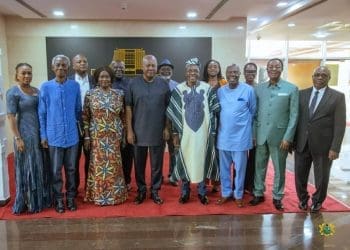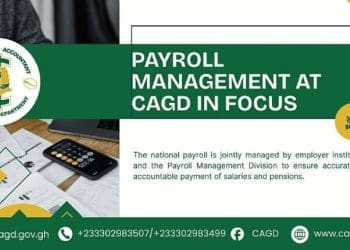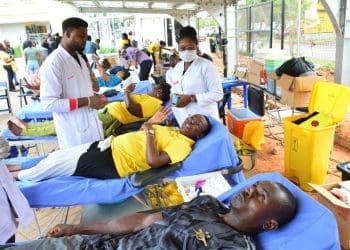In a move to promote Ghana as a healthcare investment hub in West Africa, the Health Community of West Africa (HCOWA) Association headquartered in Ghana, in collaboration with its government partner, the Ghana Health Service, represented the country at the fourth edition of the China-Africa Economic Trade Expo held in Changsha, China, pitching Ghana as a promising destination for healthcare investment, including in medical technologies, pharmaceuticals, and traditional Chinese medicine.
Held yesterday, June 12, 2025, in China, Changsha, the forum brought together African and Chinese leaders, including the Minister of Health and Child Care for Zimbabwe, Dr. Tendai Douglas Mombeshora, Yu Yanhong, Secretary and Director of the National Administration of Traditional Chinese Medicine, Wang Yiyou, Vice Governor of the People’s Government of Hunan Province, President of the HCOWA Association, Sihong Jiang, Deputy Director and Chief Physiotherapist of the Ghana Health Service, Chief Gaetan Charles Adangabey and many others.
The China-Africa Economic Trade Expo is a platform that connects businesses through business matchmaking events and focuses on traditional medicine production and trade cooperation.
In showcasing HCOWA Association’s readiness to invest in Ghana and West Africa, the Association partnered with the Hunan University of Chinese Medicine to integrate advanced and research-based traditional Chinese medicine into Ghana and the broader West African sub-region.
Speaking at the event, Prince Opoku Dogbey, Vice President of HCOWA Association, explained that the partnership aims to facilitate the integration of traditional Chinese medicine (TCM) into Ghana’s healthcare system and foster exchanges between the two countries.
This collaboration, he said, HCOWA Association will culminate in the establishment of a Centre for Cooperative Exchange on Traditional Medicine in West Africa, set to be inaugurated on June 26, 2025, in Accra, Ghana.

He emphasized that this initiative is being undertaken in close collaboration with the Traditional and Alternative Medicine Department under Ghana’s Ministry of Health, the Ghana Herbal Association, HCOWA Association, the Chinese Medical Team to Ghana, and several other strategic stakeholders. The goal is the effective integration of traditional medicine into mainstream healthcare delivery in Ghana.
In his remarks, Prince Dogbey stated that in Ghana and across the West African sub-region, herbal medicine continues to play a vital role in the health and well-being of millions. For a significant portion of the population, it is not merely an alternative but the primary form of healthcare. Herbal therapies are deeply rooted in culture, tradition, and indigenous knowledge, and are believed to effectively treat a wide range of chronic and acute conditions, especially in areas where access to conventional medical services is limited.
He noted that recent findings point to a growing demand for traditional herbal medicine in Ghana, driven by cultural acceptance, belief in the efficacy of natural remedies, affordability and accessibility (particularly in rural areas), and increasing scientific validation of plant-based treatments. This demand forms part of a broader healthcare reform agenda.
Touching on the pharmaceutical sector, Prince Dogbey highlighted the transformation taking place in Ghana and the West African region. He explained that sectors once heavily reliant on external imports and aid are now becoming engines of growth, innovation, and sustainable development. Ghana, in particular, is emerging as a significant destination for investment in medical technology and pharmaceuticals.
He explained that by 2025, Ghana’s pharmaceutical market is projected to generate revenue of $254.8 million, with oncology drugs accounting for about $39.02 million.
Meanwhile, the medical device market is expected to reach $134.66 million, with cardiovascular drugs and equipment representing the largest segment at $20.52 million. Looking ahead, the pharmaceutical and medical device market is anticipated to grow at an annual rate of 7.15% from 2025 to 2029, reaching approximately $177.52 million by 2029.
He used the opportunity to invite all Chinese and African enterprises in medical and traditional medicine solutions to the 2025 HCOWA China West Africa Summit and Expo in Accra, Ghana from 20th to 22nd August, 2025 at the Grand Arena of the Accra International Conference Centre.
Sihong Jiang, President of HCOWA Association also indicated that the increasing demand for innovative and cost-effective healthcare solutions, rising public awareness, greater health spending, and technological advancement is one that needs practical solutions.
She added that Ghana’s stable economic outlook and sustained government investments in healthcare infrastructure, such as hospitals, clinics, and diagnostic centers are creating a fertile environment for medical innovation and uptake.
She reiterated that the country is also seeing a resurgence in demand for traditional herbal medicines, reflecting a strong cultural identity and trust in natural remedies. According to him, Ghana is leveraging global partnerships to harness the power of herbal medicine and strengthen healthcare systems across West Africa.
Madam Yu Yanhong, Secretary and Director of the National Administration of Traditional Chinese Medicine also expressed optimism about the growing influence of traditional Chinese medicine on the African continent. She noted that TCM is emerging as a driving force and that its integration holds promise for delivering faster and more holistic healthcare solutions in Africa.
Dr. Tendai Douglas Mombeshora, Minister of Health and Child Care for Zimbabwe, conveyed sincere appreciation to the Chinese government for its continuous support of Africa’s healthcare development, including the deployment of Chinese medical teams across the continent.
The event was a successful one and Ghana’s flag was raised high as a potential hub of medical investments.
By PRINCE OPOKU DOGBEY














